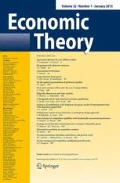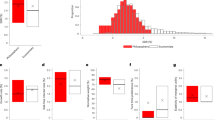Abstract
Taking climate change as an example, this paper provides new insights on the optimal provision of a long-term public good within and across generations. We write the Bowen–Lindhal–Samuelson (BLS) conditions for the optimal provision of the public good in a world divided into N countries, with two periods, present and future, and we simultaneously determine the optimal response in the first and second periods for a given rate of pure time preference. However, the Negishi weights at second period cannot be determined unambiguously, even under a “no redistribution constraint” within each generation, because they depend on non-observable future incomes; and thus on the answers to two often-overlooked ethical questions: (i) Do rich countries agree on deals which recognize that developing countries may catch up with developed countries in the long run, or do they use their negotiating powers to preserve the current balance of power? And (ii) does each country consider only the welfare of its own future citizens (dynastic solidarity) or does it extend its concern to all future human beings (universal solidarity)? Answers to (i) and (ii)—critical in the debate about how to correct the market failures causing global warming—define four sets of Negishi weights and intertemporal welfare functions, which we interpret as four mandates that countries could give to the Chair of an international negotiation on climate change to find an optimal solution. We find that in all mandates, public good provision expenditures are decreasing functions of income at first period. But each mandate leads to a different allocation of expenditures at second period and to different optimal levels of public good provision at both first and second periods. Finally, we show that only one of these four mandates defines a space for viable compromises.
Similar content being viewed by others
References
Agarwal, A., Narain, S.: Global Warming in an Unequal World, a Case of Environmental Colonialism: Delhi: Center for Science and Environment: (1991)
Aldy, J.E., Stavins, R. (eds): Architectures for agreement: addressing global climate change in the post-Kyoto world. Cambridge University Press, Cambridge (2007)
Ambrosi P., Hourcade J.-C., Hallegatte S., Lecocq F., Dumas P., Ha-Duong M.: Optimal control models and elicitation of attitudes towards climate damages. Environ Model Assess 8, 133–147 (2003)
Asheim, G.B., Mitra TL, Tungodden, B.: Sustainable recursive social welfare functions. Econ Theory (2010, this issue). doi:10.1007/s00199-010-0573-7
Azar C.: Weight factors in cost-benefit analysis of climate change. Environ Res Econ 13, 249–268 (1999)
Burniaux, J.-M., Oliveira Martins J.: Carbon Leakages: A general equibrium view. Econ Theory (2010, this issue). doi:10.1007/s00199-010-0579-1
Chichilnisky, G., Narain, S.: The abatement of carbon emissions in industrial and developing countries. In: Jones, T. (ed.) The Economics of Climate Change, pp. 159–170: Paris: OECD (1994)
Chichilnisky, G.: Sustainable markets with short sales. Econ Theory (2010, this issue)
Chichilnisky, G., Sheeran K. A.: Saving Kyoto: London: New Holland Publishers Ltd (2009)
Chichilnisky, G., Heal, G.: Who should abate carbon emissions: an international viewpoint. Econ Lett 443–449 (1994)
Chichilnisky, G., Heal, G., Starrett, D.: Equity and efficiency in environmental markets: global trade in carbon emissions. In: Chichilnisky G., Heal, G. (eds.): Environmental Markets, pp. 46–67: New York: Colombia University Press (2000)
Chipman, J.S., Guoqiang, T.: Detrimental externalities, pollution rights, and the “coase theorem”. Econ Theory (2010, this issue)
Cooper R.J.: International approaches to global climate change. World Bank Res Obs 15, 145–172 (2000)
Den Elzen, M., Berk, M., Schaeffer, M., Olivier, J., Hendriks, C., Metz, B.: The Brazilian Proposal and other Options for International Burden Sharing: An evaluation of methodological and policy aspects using the FAIR Model. RIVM report No. 728001011: Bilthoven (1999)
Dutta, P.K., Radner, R.: Capital growth in a global warming model: will China and India sign a climate treaty? Econ Theory (2010, this issue)
Figuières, C., Tidball, M.: Sustainable exploitation of a natural resource: a satisfying use of Chichilnisky criterion. Econ Theory (2010, this issue). doi:10.1007/s00199-010-0579-1
Fisher, B.S., Nakicenovic, N., Alfsen, K., Corfee Morlot, J., de la Chesnaye, F., Hourcade, J.-C., Jiang, K., et al.: Issues related to mitigation in the long term context. In: Metz, B., Davidson, O.R., Bosch, P.R., Dave, R., Meyer, L.A. (eds.): Climate Change 2007: Mitigation. Contribution of Working Group III to the Fourth Assessment Report of the Intergovernmental Panel on Climate Change, pp. 169–250: Cambridge: Cambridge University Press (2007)
Foley, D.K.: The economic fundamentals of global warming. In: Harris, J.M., Goodwin, N.R. (eds.): Twenty-First Century Macroeconomics: Responding to the Climate Challenge: Northampton: Edward Elgar Publishing (2009)
Godard, O.: Sur l’éthique, l’environnement et l’économie. La justification en question. Cahier du Laboratoire d’Econométrie de l’Ecole Polytechnique: Paris: Ecole Polytechnique (2000)
Goldemberg, J., Squitieri, R., Stiglitz, J., Amano, A., Shaoxiong, X., Saha, R.: Introduction: scope of the assessment. In: Bruce, J.P., Lee, H., Haites, E.F. (eds.): Climate Change 1995: Economic and Social Dimensions of Climate Change, Contribution of Working Group III to the Second Assessment Report of the Intergovernmental Panel on Climate Change, pp. 125–144: Cambridge: Cambridge University Press (1996)
Grubb, M., Vrolijk, C., Brack, D.: The Kyoto Protocol, a Guide and an Assessment: London: Royal Institute of International Affairs (1999)
Guesnerie R.: Calcul économique et développement durable. Rev Econ Paris 55(3), 363–382 (2004)
Gupta, S., Tirpak, D.A., Burger, N., Gupta, J., Höhne, N., Boncheva, A.I., Kanoan, G.M., et al.: Policies, instruments and co-operative arrangements. In: Metz, B., Davidson, O.R., Bosch, P.R., Dave, R., Meyer, L.A. (eds.): Climate Change 2007: Mitigation. Contribution of Working Group III to the Fourth Assessment Report of the Intergovernmental Panel on Climate Change, pp. 745–808: Cambridge: Cambridge University Press (2007)
Hallegatte S., Hourcade J.-C., Dumas P.: Why economic dynamics matter in assessing climate change damages: illustration on extreme events. Ecol Econ 62(2), 330–340 (2007)
Heal G.: Discounting: a review of the basic economics. Univ Chicago Law Rev 74, 59–77 (2007)
Helm C., Simonis U.E.: Distributive justice in international environmental policy: Axiomatic foundation and exemplary formulation. Environ Val 10(1), 5–18 (2001)
Hourcade, J.-C., Gilotte, L.: Differentiated or uniform international carbon taxes: theoretical evidences and procedural constraints. In: Chichilnisky, G., Heal, G. (eds.) Environmental Markets: Equity and Efficiency, pp.135–155: New York: Columbia University Press (2000)
Hourcade J.-C., Ghersi F.: The economics of a lost deal: Kyoto, The Hague, Marrakesh. Energ J 23(3), 1–26 (2002)
Hourcade J.-C., Ambrosi P., Dumas P.: Beyond the Stern Review: Lessons from a risky venture at the limits of the cost-benefit analysis. Ecol Econ 68(10), 2479–2484 (2009)
Hourcade J.-C., Ambrosi P., Dumas P., Ghersi F.: The economics of a lost deal: Kyoto, The Hague, Marrakesh. Energ J 23(3), 1–26 (2002)
Hourcade, J.-C., Ambrosi, P., Dumas, P., Gilotte, L.: Differentiated or uniform international carbon taxes: theoretical evidences and procedural. In: Chichilnisky, G., Heal, G. (eds.): Environmental Markets, pp. 135–168: New York: Colombia University Press (2000)
Intergovernmental Panel on Climate Change (IPCC): Radiative Forcing of Climate Change and an Evaluation of the IPCC IS92 emission scenarios: Delhi: Cambridge University Press (1994)
Intergovernmental Panel on Climate Change (IPCC) Impacts, Adaptation and Vulnerability. Contribution of Working Group II to the Fourth Assessment Report of the Intergovernmental Panel on Climate Change: Cambridge: Cambridge University Press (2007)
Jacoby H.D., Prinn R.G., Schmalensee R.: Kyoto’s Unfinished Business. Foreign Aff 77, 54–66 (1998)
Karp, L., Zhang, J.: Taxes versus quantities for a stock pollutant with endogenous abatement costs and asymmetric information. Econ Theory (2010, this issue). doi:10.1007/s00199-010-0561-y
Lauwers, L.: Intergenerational equity, efficiency, and constructibility. Econ Theory (2010, this issue)
Lecocq, F., Crassous, R.: International climate regime beyond 2012. Are quota allocation rules robust to uncertainty? World Bank Pol Res Work Pap 3000 (2003)
Meyer, A.: Contraction and convergence, the solution to climate change. Schumacher Briefing No. 5: Green Books (2002)
Negishi T.: Welfare economics and existence of an equilibrium for a competitive economy. Metroeconomica 12, 92–97 (1960)
Nordhaus W.D., Yang Z.: A regional dynamic general-equilibrium model of alternative climate-change strategies. Am Econ Rev 86, 741–765 (1996)
Nordhaus W.D., Yang Z.: A review of the stern review on the economics of climate change. J Econ Lit 45, 686–702 (2007)
Organization for Economic Co-operation and Development (OECD): International Economic Instruments and Climate Change: Paris: OECD (1993)
Ostrom, E.: Nested externalities and polycentric institutions: must we wait for global solutions to climate change before taking actions at other scales? Econ Theory (2010, this issue). doi:10.1007/s00199-010-0558-6
Posner E.A., Sunstein C.R.: Should greenhouse gas permits be allocated on a per capita basis?. Calif Law Rev 97(1), 51–93 (2009)
Rawls J.: A Theory of Justice. The Belknap Press of Harvard University Press, Cambridge (1971)
Rezai, A., Foley, D.K., Taylor, L.: Global warming and economic externalities. (2010, this issue)
Ringius L., Torvanger A., Holtsmark B: Can multi-criteria rules fairly distribute climate burdens – OECD results from three burden sharing rules. Energ Pol 26(10), 777–793 (1998)
Sandler T., Smith K.V.: Intertemporal and intergenerational pareto efficiency. J Environ Econ Manag 2, 151–159 (1976)
Schelling T.C.: Intergenerational discounting. Energ Pol 23, 395–401 (1995)
Sen A.K.: On Ethics and Economics. Basil Blackwell Publishers, Oxford (1987)
Shalizi Z., Lecocq F.: To Mitigate or to Adapt: Is that the question? Observations on an appropriate response to the climate change challenge to development strategies. World Bank Res Obs 25(2), 295–321 (2010)
Sheeran K.: Who should abate carbon emissions? A note. Environ Resource Econ 35(2), 89–98 (2006)
Stern N.: The Economics of Climate Change: The Stern Review:. Cambridge University Press, New York, Cambridge (2007)
Sterner T., Persson U.M.: An even Sterner review: introducing relative prices into the discounting debate. Rev Environ Econ Pol 2(1), 61–76 (2008)
Stone C.D.: Common but differentiated responsibilities in international law. Am J Int Law 98(2), 276–301 (2004)
World Bank: World Development Indicators: Washington DC: World Bank (2004)
World Bank: World Development Report 2009: Washington DC: World Bank (2009)
Author information
Authors and Affiliations
Corresponding author
Additional information
The authors are grateful to François Bourguignon, Graciela Chichilnisky, Sylviane Gastaldo, Roger Guesnerie, Cédric Philibert, Gilles Rotillon, Zmarak Shalizi, Tarik Tazdait, David Wheeler and anonymous referees for very constructive comments on earlier versions of this manuscript. The authors would also like to thank the participants of workshops and seminars in Kyoto, Bilbao, La Réunion, Washington DC, and Paris for helpful discussions.
Rights and permissions
About this article
Cite this article
Lecocq, F., Hourcade, JC. Unspoken ethical issues in the climate affair: Insights from a theoretical analysis of negotiation mandates. Econ Theory 49, 445–471 (2012). https://doi.org/10.1007/s00199-010-0589-z
Received:
Accepted:
Published:
Issue Date:
DOI: https://doi.org/10.1007/s00199-010-0589-z




